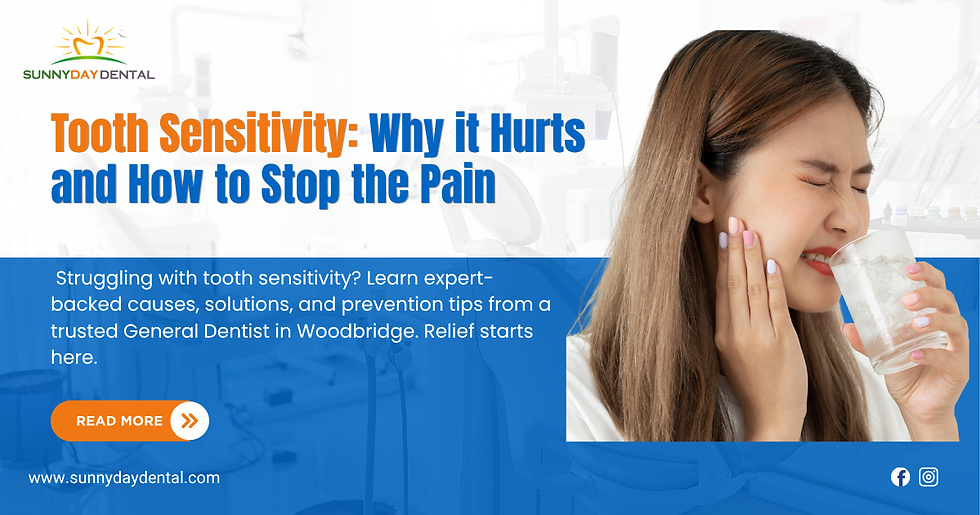Dental Emergencies: What to Do When You Can't Wait
- Sunny Day Dental
- May 20
- 3 min read

Dental emergencies are unexpected, painful, and often frightening. Whether it’s a cracked tooth from biting into something hard, a knocked-out tooth during a game, or sudden severe tooth pain at night, dental emergencies require fast action and expert care.
According to the American Dental Association (ADA), dental emergencies can lead to long-term oral health issues if not treated promptly. That’s why knowing what qualifies as an emergency—and what steps to take—can save your tooth, prevent infection, and preserve your overall well-being.
What Counts as a Dental Emergency?
Not all oral issues require urgent dental treatment. However, the following situations usually qualify as true dental emergencies:
Severe, persistent toothache
Knocked-out (avulsed) tooth
Cracked, chipped, or broken teeth with pain or bleeding
Gum abscess or facial swelling
Loose or lost dental fillings/crowns causing pain
Bleeding after tooth extraction that won’t stop
Signs of infection like pus, bad breath, or fever
If you’re unsure, call your dentist immediately. Describing your symptoms can help determine if you need emergency dental care in Woodbridge or if the issue can wait.
First Aid Steps Before You See a Dentist
Here’s what to do while waiting for urgent dental treatment:
Toothache: Rinse with warm salt water. Gently floss to remove trapped food. Do not place aspirin directly on the gum.
Knocked-Out Tooth: Hold it by the crown (not the root), rinse gently, and place it in milk or a tooth-preservation solution. Seek dental emergency care within 30 minutes.
Cracked Tooth: Rinse your mouth and use a cold compress to reduce swelling. Avoid chewing on the affected side.
Lost Crown: Apply a tiny bit of toothpaste or denture adhesive inside the crown and slip it back on temporarily.
Bleeding Gums or Injuries: Rinse, apply gentle pressure with gauze, and head to a dental office if bleeding persists beyond 10–15 minutes.
When to Head Straight to the Dentist
Here’s the golden rule: If it hurts, bleeds, or interferes with your ability to eat, speak, or sleep—it’s an emergency. Prompt dental emergencies care helps prevent complications like infection, tooth loss, or systemic issues.
Many clinics now offer same-day appointments and after-hours emergency dental care in Woodbridge so patients don’t suffer needlessly.
When Should You Seek Emergency Dental Help?
Seek urgent dental treatment immediately if you experience:
Severe pain or swelling
Bleeding that doesn’t stop
A tooth that’s knocked out or broken
Signs of infection (pus, fever, foul taste) Time is critical—early action protects your smile.
Why Delaying Treatment Is Risky
Delaying care during dental emergencies can lead to serious consequences:
Infection spreading to other parts of the body
Permanent damage to teeth and gums
Increased treatment costs due to complications
Remember, even small issues can escalate fast. Prioritize your dental health the same way you would any other part of your body.
Need Emergency Help in Woodbridge?
If you’re facing any kind of dental emergency, don’t wait. At Sunny Day Dental, we specialize in urgent dental treatment and same-day emergency dental care in Woodbridge. Our experienced dentists are equipped to handle everything from traumatic injuries to sudden toothaches with compassion and speed.
FAQs About Dental Emergencies
1. Can a tooth infection be life-threatening?
Yes. If left untreated, a dental abscess can spread to the bloodstream, leading to sepsis—a medical emergency. Always get infections checked immediately.
2. Is a chipped tooth always a dental emergency?
Not always. If there’s no pain or sharp edges, it can often wait. But if the nerve is exposed or you feel discomfort, see your dentist right away.
3. What if I lose a filling at night?
Use dental cement from a pharmacy or chew sugar-free gum to temporarily fill the space. Schedule a dental appointment first thing in the morning.
4. How do I know if my jaw pain is a dental emergency?
If jaw pain is sudden, severe, or comes with swelling or fever, it may signal an infection or TMJ issue. It’s best to get evaluated by a dentist immediately.
5. Are dental emergencies covered by insurance?
Most dental insurance plans cover dental emergencies, especially for trauma or infection. Check with your provider or clinic beforehand for details.




Comments